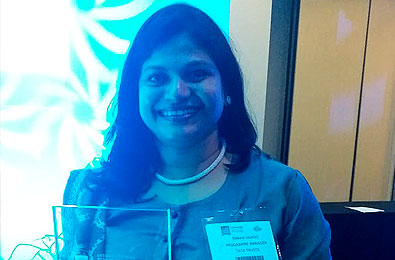Madrasa Programme
Muslims are the largest minority community in India, comprising 14.23% of the country’s total population (Census 2011). However, they lag behind in most human development indicators. According to the Sachar Committee Report (2006), literacy rate among Muslims was only 59.1%. More than a quarter of students in the 6-14 range had either never attended school, or had dropped out. Only 23.9% Muslims completed matriculation, far below the national average of 42.5%, while only one out of 25 under-graduate students and one of 50 post-graduate students in premier colleges was Muslim. In terms of unemployment, Muslims were mainly self-employed or engaged in unorganised sectors.
Through the Madrasa Programme, the Tata Trusts have engaged with educational organisations working in areas with large Muslim populations. Interventions are focused on improving the quality of teaching and learning processes and introducing contemporary methods of learning such as activity-based approach and the integration of technology. The aim is to enrich learning processes in mathematics, science and languages that are being taught to children in madrasas.
Some of the crucial facets of the Trusts’ work in this space includes:
- Training madrasa teachers in modern concepts of teaching and learning, such as child-centric teaching methodologies that are participative, interactive and based on the spirit of constructivist learning.
- Placing teachers trained by partners and education experts in madrasas, so they can train other teachers on creating teaching and learning materials, and active learning models.
- Working closely with madrasa teachers on a regular basis to handhold them in teaching practices.
- Directly running learning camps for children to bridge gaps in learning, and to promote a vibrant environment for learning science and maths. These camps also help children develop skills such as listening, reading and writing.
- Partner organisations who design learning materials such as grade-appropriate workbooks and language-learning materials such as flash cards.
The Trusts have also introduced modules such as the Integrated Approach to Technology in Education (ITE) and Integrating Dini and Dunyavi (IDD) in the madrasas. ITE teaches children how to use technology to undertake curriculum-related projects. Students at the madrasas would use the internet to enhance their current knowledge, connect with the outside world, and develop their own learning of textbook content through the use of online learning resources. This initiative has been adopted by six organisations, and reaches out to 5,000 children.
IDD was piloted in four madrasas in West Bengal. Since then, it has been extended to eastern Uttar Pradesh, Kishanganj in Bihar and a pocket in Mumbai.
The objective of this initiative is to connect science, math and social sciences with the dini taalim about Islam so that children can see that the teachings of Islam are not isolated from the world of science. As part of this initiative, students map India and Arabia on the world map, and highlight the Hijrat of Prophet Mohammed (SAS); make a project on Muslim scientists; study Islamic architecture and the geometric shapes that are reflective of this style; make a PowerPoint presentation on human joints and relate it to the ones involved in different postures during namaaz, etc. These activities provide a pedagogical framework to integrate science, maths and geography with the Islamic way of life. Madrasa teachers are trained to make these connections via lesson plans.
The Trusts have adopted a cascade approach where a few ‘model’ madrasas handhold a cluster of madrasas in nearby areas to scale up their interventions. So far, the Trusts work with approximately 400 madrasas, out of which 75 are model madrasas.
The focus is on engaging with madrasa boards in these areas to cover government-aided madrasas. Resource partners like Nalanda help implement the Trusts’ initiative by developing training and resource manuals that will encourage madrasas to involve parents, local authorities and madrasa boards for systemic improvement in these learning institutions. The Trusts also builds alliances with government bodies such as the Ministry of Minority Affairs and state education boards in order to influence policy and legislation to modernise the education processes in madrasas.
Based on experience, the Trusts plan to develop a consolidated madrasa modernisation programme to scale up this initiative. The key elements of scaling up include:
- Teacher training and learning camps for madrasa children in order to improve teaching and learning in maths, science and social sciences.
- Training teachers to use ITE for higher order thinking, authentic learning, improving learning of concepts and fostering values, life skills and digital citizenship among children and adolescents.
- Using a pedagogic framework for learning and teaching to make connections between Islam and the scientific world wherever possible.
- Providing life skills and vocational and career counselling support to adolescents in madrasas.
- Informing other practitioners in the area by increasing capacity and sharing resources and manuals to bring systemic improvement in madrasa education.
- Organising a cohort of best practicing organisations and institutes as a core group to contribute and enrich further learning and exposure to global best practices.
- Providing linkages to scholarship programmes for higher education and building a portal for career guidance.
The Trusts are building this programme into the Trusts’ Eastern UP initiative, and aim to extend it to other pockets in West Bengal.

